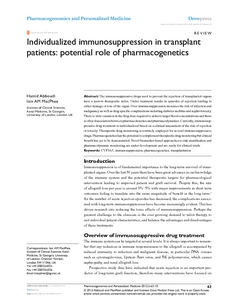Abboudi, H; Macphee, IA
(2012)
Individualized immunosuppression in transplant patients: potential role of pharmacogenetics.
Pharmgenomics Pers Med, 5.
63 - 72.
https://doi.org/10.2147/PGPM.S21743
SGUL Authors: MacPhee, Iain Angus MacGregor
![[img]](https://openaccess.sgul.ac.uk/101234/1.hassmallThumbnailVersion/pgpm-5-063.pdf)  Preview |
|
["document_typename_application/pdf; charset=binary" not defined]
Published Version
Download (226kB)
| Preview
|
Abstract
The immunosuppressive drugs used to prevent the rejection of transplanted organs have a narrow therapeutic index. Under treatment results in episodes of rejection leading to either damage or loss of the organ. Over immunosuppression increases the risk of infection and malignancy as well as drug specific complications including diabetes mellitus and nephrotoxicity. There is wide variation in the drug dose required to achieve target blood concentrations and there is often dissociation between pharmacokinetics and pharmacodynamics. Currently, immunosuppressive drug treatment is individualized based on a clinical assessment of the risk of rejection or toxicity. Therapeutic drug monitoring is routinely employed for several immunosuppressive drugs. Pharmacogenetics has the potential to complement therapeutic drug monitoring but clinical benefit has yet to be demonstrated. Novel biomarker-based approaches to risk stratification and pharmacodynamic monitoring are under development and are ready for clinical trials.
Statistics
Item downloaded times since 04 Jul 2013.
Actions (login required)
 |
Edit Item |




